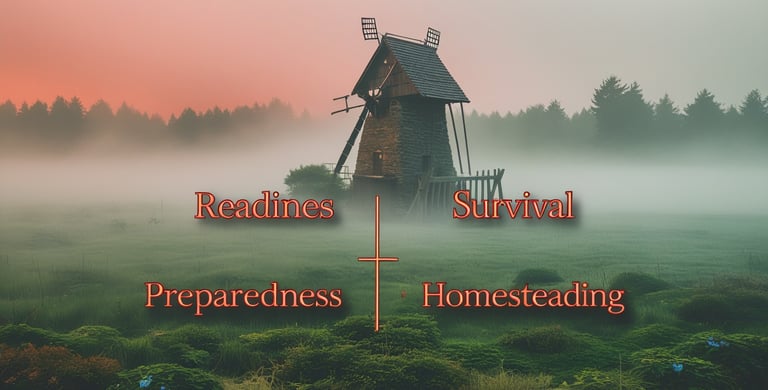Survival Preparedness Neglected Truth: "Crisis is more social than mechanical."
4FORTITUDER - READINESS, SURVIVAL, PREPAREDNESS, HOMESTEADING
Survival Preparedness Neglected Truth: "Crisis is more social than mechanical."
When we think of survival, the default image is one of stockpiled food, backup generators, and bug-out bags. It’s tactical. It’s mechanical. It’s measurable. But when real crisis hits—a natural disaster, economic collapse, or war—the gear is not what fails first. People do. The most devastating failures are not technological, but relational.
We prep for logistics—food, water, tools, shelter. But how many prep for the collapse of trust, for betrayal under pressure, for the loneliness that drives men mad? Most people don’t die in disasters because they ran out of calories. They die from the psychological spiral of panic, isolation, and interpersonal breakdown. The real crisis is human.
The Myth of the Lone Wolf
Modern survivalism often idolizes the lone, self-reliant man. But history—and psychology—tell a different story.
In prolonged disasters, those who survive are those who remain connected to functioning networks: families, faith communities, tightly bonded groups.
PTSD in war survivors is most severe not when the violence is greatest, but when the relational bonds break.
Isolation increases cortisol levels, decreases immune function, and amplifies irrational decision-making.
The lone wolf doesn’t thrive. He deteriorates.
What Breaks in Real Crises
Disasters stress the fabric of community first. Consider:
Marriages fracture under sustained pressure.
Families splinter over resource control or conflicting visions of what to do next.
Neighborhoods turn adversarial when food is scarce and rumors spread.
You cannot predict who will panic, who will betray, who will harden into calm leadership. But you can prepare by fostering loyalty and clarity now.
The Psychology of Panic
Panic is not a lack of gear—it’s a lack of grounding. When people have no inner structure, no practiced resilience, no mutual trust, they become liabilities.
Cognitive dissonance leads people to deny the obvious until it’s too late.
Fear contagion spreads faster than any virus.
Unmet expectations breed conflict more quickly than unmet needs.
A family that hasn’t trained to handle crisis dynamics will turn on itself before the food runs out.
Prepping Social Structures, Not Just Systems
We train our bodies. We hoard tools. But few men rehearse the hard conversations, the boundary-setting, the leadership dynamics that define social resilience. If you want to lead your family through collapse:
Create systems of communication and authority now.
Define roles, expectations, and fallback plans in advance.
Run simulations—not just fire drills, but scenarios of moral compromise, relational strain, and resource allocation.
Teach emotional regulation and conflict management like it’s as important as marksmanship.
Prepping your gear without prepping your people is a failure of duty.
Historical Case Studies
The Donner Party had supplies, but failed because trust and leadership collapsed.
Siege survivors in Sarajevo reported that betrayal by neighbors was more traumatizing than food scarcity.
Tribes and clans that maintained strong oral traditions and communal rituals outlasted more technologically advanced groups fractured by infighting.
These stories all teach the same truth: without social order, survival devolves into savagery.
Contrarian Insight: You Might Not Be the Leader You Think
Many men assume they’ll rise to the occasion. They won’t. Leadership in crisis is earned now, in peacetime, through discipline, virtue, and relational depth.
Without established credibility, decisiveness, and emotional control, your authority in a collapse will be ignored.
Pathways to Mastery
Foundation Level:
Build trust with those closest to you through honesty and consistent action.
Host regular family meetings with structured dialogue about values, risks, and roles.
Application Level:
Simulate scenarios where emotional pressure is high (loss, scarcity, threat).
Establish rituals that reinforce unity: shared meals, prayer, physical labor.
Mastery Level:
Become a local pillar of stability: form men’s groups, mutual aid pacts, ethical action plans.
Train others in community resilience—not just survival.
Fortitude Essentials: Immediate Action Points
Philosophical:
Crisis tests character more than contingency plans.
The strongest shelter is a trusted bond.
Actionable:
Identify your relational weak points—repair or sever now.
Practice leading under pressure: small group logistics, emotional coaching, decision-making.
Final Wisdom Quotes
"If you want to go fast, go alone. If you want to go far, go together." — African Proverb
"Two are better than one, because they have a good return for their labor... But pity anyone who falls and has no one to help them up." — Ecclesiastes 4:9-10
"The most dangerous thing in a collapse isn’t hunger. It’s your neighbor in panic." — Disciple of Wisdom
"People support what they help create. Train them before you need them." — James Clear
"In crisis, character becomes command." — Unknown
Call to Action
Rebuild your circle. Fortify trust. Train your team. Subscribe to the Virtue Crusade and prepare for the real test: keeping your soul—and your people—alive when the world falls apart.


